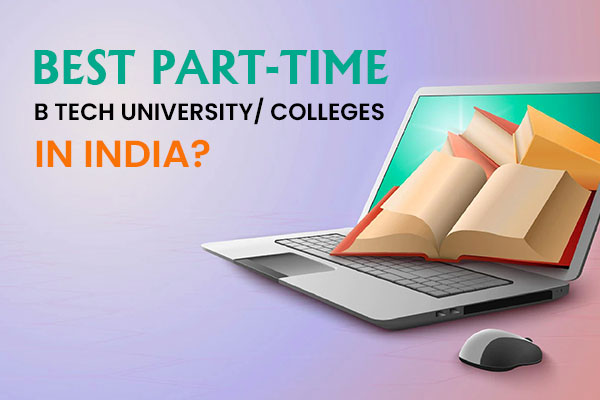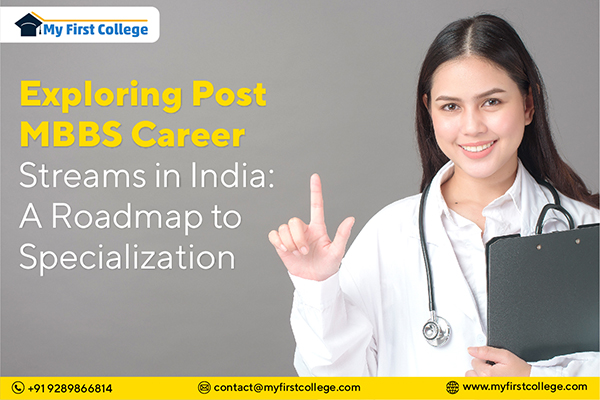Exploring Post - MBBS Career Streams in India: A Roadmap to Specialization
Becoming a Doctor is a significant achievement in one’s life after completion of (MBBS) Bachelor of Medicine and Bachelor of Surgery in India. However, for many medical graduates, the question of what stream to pursue after MBBS looms large. The choices are vast, ranging from clinical specializations to non-clinical and research-oriented fields. In this article, we'll delve into some of the popular post-MBBS streams in India, providing insights into each path to help graduates make informed decisions about their future careers.
Clinical Specializations:
1. MD/MS Programs:
After completing the MBBS qualified student can pursue (MD) Master of Doctor or (MS)Master of Surgery to make themselves more specialized in specific branch of medicine. These disciplines could be Surgery , Obstetrics, Internal Medicine, Gynecology, Pediatrics, and Orthopedics and many more. MD/MS programs helps you to specialize yourself in the related field with in-depth knowledge .The study involves laboratory training and clinical research .
2. Diplomate of National Board (DNB):
DNB is a postgraduate or post-doctoral equivalent degree awarded by the National Board of Examinations (NBE). It is a credible alternative to MD/MS and offers specializations in various clinical disciplines. DNB programs are recognized by the Medical Council of India (MCI) and are considered equivalent to MD/MS degrees.
Non-Clinical Specializations:
1. Public Health:
Another stream to choose after the completion of MBBS is prevention of Public Health. It is like becoming virologists, Scientists, epidemiology ect. and can have the opportunity to serve Nation by joining some of the reputed Institutes in India like National Institute of Virology (NIV)Pune or Indian Council of Medical Research (ICMR)Delhi. These fields are more lucrative as it looks after the public health, development of vaccination and prevention of public health from deadly diseases and culminating herd immunity.
2. Hospital Administration:
Hospital administration is another non-clinical avenue that caters to the management side of healthcare institutions. Under this field the professionals are involved in efficient functioning and maintenance of hospitals facilities and equipments including administration. The professionals ensure quality healthcare delivery, management of hospital resources. Some of the prestigious institute of this country in Tata Institute of Social Science (TISS) and Hospital Administration by Apollo Institutes of Hospitals etc.
Research-Oriented Streams:
1. Ph.D. in Medicine:
Some of the Research oriented streams could be pursuing Ph.D in Medicine, which can further lead to research and development. Some of the well known institute for this field would be the Indian Council of Medical Research (ICMR) or the All India Institute of Medical Sciences (AIIMS) offer Ph.D. programs.
2. Clinical Research:
Clinical research is another branch to pursue higher studies after the completion of MBBS program .It involves the testing and efficacy on new medicines and drugs before launching in the market. The professionals can join the pharmaceutical companies or research organizations like the Indian Institute of Clinical Research (IICR) offer courses in clinical research.
Super-Specializations:
1. DM/MCh Programs:
Super-specialization is the highest level of clinical training one can achieve. Doctorate of Medicine (DM) and Master of Chirurgiae (MCh) programs are designed for doctors.
The Master of Chirurgiae (MCh) and Doctorate of Medicine (DM) programs is the pinnacle of clinical specialization in the field of medicine in India. These are the highest level of medical and surgical disciplines undertaken by the medical professionals to specialize themselves in related fields.DM programs focus on medical branches such as Endocrinology Nephrology ,Cardiology, Plastic Surgery , Gastroenterology and Neurology etc. These professionals immensely contribute to the medical knowledge and patient care, often pioneering new treatments and procedures.
2. Fellowships:
Various fellowships are available for doctors who want to gain expertise in niche areas. These can range from fellowships in critical care, interventional cardiology, to infectious diseases. Institutes and hospitals often offer these programs to enhance specialized skills.
MBBS programs offer a comprehensive and holistic education in medicine. Upon completing MBBS, graduates have a myriad of career options. An MBBS degree is internationally recognized, providing opportunities for doctors to practice or pursue further education in different countries. This global recognition opens doors for collaborative research, international fellowships, and diverse cultural experiences.
Considerations:
Long Duration of Education: Pursuing MBBS involves a significant time commitment. The duration of the program, including internship and residency, can span several years. Aspiring doctors should be prepared for the rigorous and extended educational journey. Emotional Challenges: Healthcare professionals often encounter emotionally challenging situations. Dealing with illness, loss, and high-pressure situations is part of the job, requiring emotional resilience and coping skills. Conclusion: Choosing MBBS is a commendable decision for those passionate about healthcare and dedicated to serving others.
Read Also:
Top Courses
Updates
-

Part Time MBA Programs in India - Unlimited guidelines 2023
September 09, 2022 -

Can I Pursue a Part Time B.Tech after Getting My Diploma?
September 09, 2022 -

7 Best Universities Offering Part-time M.Tech
September 05, 2022 -

Best Part-time B Tech University/ Colleges In India?
June 28, 2022

